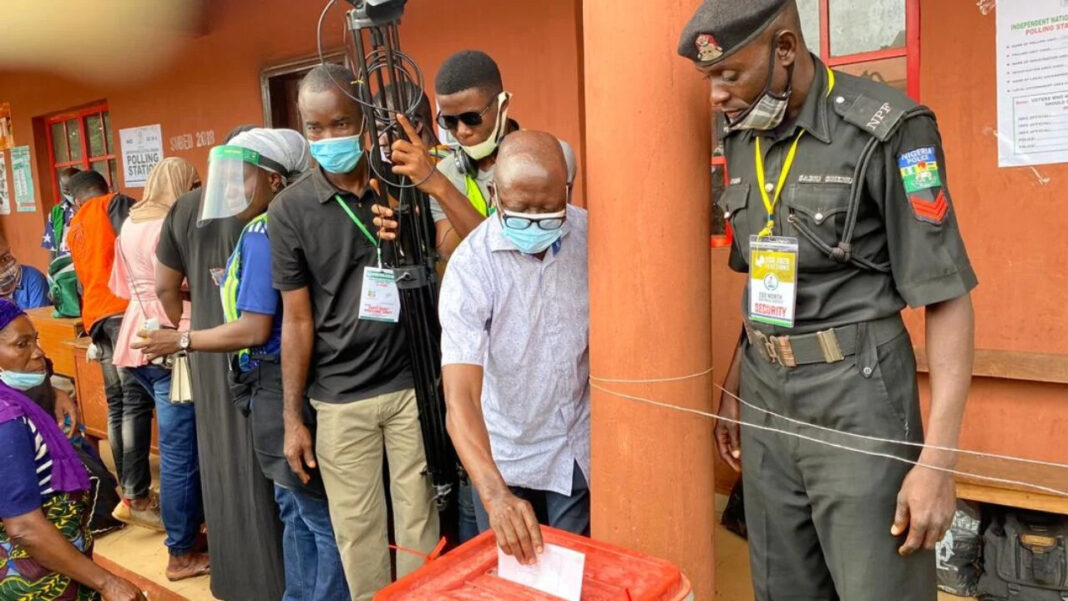Long-standing systemic flaws and impunity encouraged by police inaction bolstered the suppression of media freedom during Nigeria’s general elections of February 25 and March 18, a report released by the European Union Election Observation Mission (EU EOM) on June 27 has said.
According to the 92-page report, EU EOM observers confirmed 10 incidents of attacks involving media houses covering elections on February 25 – the presidential and federal legislature elections date – and 21 cases on 18 March, the governorship and state legislature elections date.
“Several attacks occurred in plain sight of the police, and in some cases the police detained the journalist who documented irregularities, but not the attacker,” the report said. “Such incidents clearly demonstrate the absence of actual protection of media practitioners. Only in one of these instances did police open an investigation against the assailant.”
The report said overall, “impunity encouraged by police inaction was detrimental to freedom of expression, particularly as independent and trusted outlets were targeted, and do not accord with Nigeria’s regional and international commitments for the protection of the media and freedom of expression as a whole.”
To guard against future media freedom suppression during elections, the EU EOM asked the Nigerian government to provide adequate protection for freedom of expression by developing a comprehensive operational framework underpinned by the skills and means for ensuring prompt investigation and prosecution of all types of attacks against media practitioners.
Attacks on journalists unpunished
The report noted that the 2023 elections had energetic campaign coverage that was, however, marked by divisive rhetoric, while attacks on journalists went unpunished.
Though facing economic hardship, violence, and institutional pressures, the media, EU EOM remarked, offered extensive coverage of the elections, promoted voter information campaigns, and engaged in fact-checking.
“Failure by law enforcement agencies to prosecute persons who attacked, intimidated, harassed, or obstructed journalists prior to, on and after both election days, put a heavy strain on the overall reporting environment,” the report stated.
It listed Lagos and Kano among states where physical assaults against media practitioners were recorded, adding that the police, on election days, arrested journalists on bogus charges while the online harassment of reporters, other media workers and fact-checkers went unpunished.
Broadcast regulator lacks independence
The EU EOM report noted that the National Broadcasting Commission (NBC), the broadcast industry regulator, lacks independence and transparency and does not enjoy stakeholders’ trust, which was why the commission made several decisions during the campaign and after both election days that hampered the freedom of the media.
Cases include when the regulator, just before the start of the campaign, in August 2022, revoked the licences of 53 stations on vague grounds.
“In all cases, NBC did not allow for due process as broadcasters were not given a chance to explain themselves,” the report said.
Alongside the regulator, several EU EOM interlocutors noted that some state governors and state-level agencies frequently used various housing, sanitary or environmental rules to exert pressure on media owners
“The EU EOM observers reported about journalists abstaining from critical reporting, fearing retribution from the governor in at least 20 states. Overall, self-censorship at state-level noticeably reduced the diversity of information available to voters and enabled the governor to keep a sway on the information environment in the respective state,” the report stated.
The E.U observer team’s observation is in line with the Media Foundation for West Africa’s (MFWA) report on the various assault on the media during Nigeria’s general elections, we recorded more violations. The incidents captured in our report ranged from physical attacks on journalists, on broadcast stations, and government sanctions/threats against media houses.
Meanwhile, the Nigerian government has rejected the EU EOM’s report, saying it does not portray the realities of what transpired during the elections.
“We strongly reject, in its entirety, any notion and idea from any organisation, group and individual remotely suggesting that the 2023 election was fraudulent,” a statement signed by Dele Alake, President Bola Ahmed Tinubu’s Special Adviser on Special Duties, Communication and Strategy, read on July 2.
The statement however failed to respond to the specific concerns the EU EOM’s report raised about the serial attacks against the media during the elections.
The MFWA correspondent emailed the Presidency to react directly to the allegations of suppression of media freedom during the elections but did not receive any response.
Calls and messages to presidential spokesman Dele Alake and email inquiries to the Presidency were not responded to.
The new government has inherited a dismal press freedom record from its predecessor administration of the same All Peoples Congress political party. The MFWA recently published a catalogue of the Buhari era repressions for the attention and action of the new administration.
We reiterate our call on President Tinubu to probe and redress the major press freedom violations which occurred under his predecessor, including those which occurred during the recent elections. In particular, the new administration should tackle the emblematic cases of impunity such as the killing of Maxwell Nashan, a journalist with the Federal Radio Corporation of Nigeria (FRCN), Adamawa State. Nashan was abducted from his home and later found tied and muzzled in a bush on January 15, 2020, with his body hacked at several places.
Another case of impunity that we recommend to the President’s attention is the killing by security agents of Pelumi Onifade, a student journalist with the online channel Gboah TV. Onifade was attacked by security officers and carried away while covering the #EndSars protests on October 24, 2020. About a week later, his body was found in a mortuary in Ikorodu Lagos. There has since been no accountability over the intern journalist’s death.





